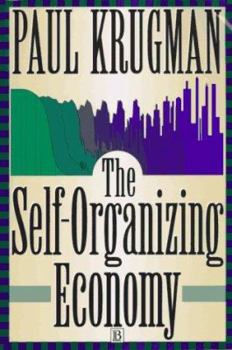The Self-Organizing Economy
Select Format
Select Condition 
Book Overview
Written in an informal and conversational style, " The Self-Organizing Economy shows how models of self-organization, "order from stability," can be applied to economic phenomenon. This concept, which has become increasingly influential in the last few years, can explain the formation of cities and business cycles. The book includes powerful insights of conventional economic analysis and strands from many disciplines, from location theory to biology,...
Format:Paperback
Language:English
ISBN:1557866996
ISBN13:9781557866998
Release Date:January 1995
Publisher:Blackwell Publishers
Length:122 Pages
Weight:0.42 lbs.
Dimensions:0.3" x 6.0" x 8.9"
Customer Reviews
2 ratings
Non-jargony bridge from complex systems to economics, and back
Published by Thriftbooks.com User , 17 years ago
This is a delightful little read, bringing bits of complex-systems analysis to economics. It requires little in the way of mathematics. Because it's Paul Krugman, it's effortlessly charming, self-deprecating, and eloquent. Those who are only familiar with Krugman's excellent New York Times op-ed pieces may not know that he was (and still is?) a world-renowed economist whose work centered on "economic geography" -- i.e., understanding why it is that economic activity on so many scales is localized rather than dispersed. Why do cities exist? Why do they exist where they do? Why is economic activity so concentrated in the West? Why does Africa have such a hard time becoming part of the "developed world"? Clearly there are connections between economic geography and international development. A complete theory of economic geography would explain not only why activity concentrates where it does, but what policymakers can do to bring activity to inactive areas. The Self-Organizing Economy starts with some simple models of geographic concentration. Suppose that there's a certain benefit to moving your business near an economic center like a city; the benefit may be something as clear-cut as reduced transportation costs. But being further away from a city has its benefits as well, in decreased rent. Tune your parameters accordingly, to qualitatively match observed behavior. Start with a hypothetical land area where businesses are located at random, then use a computer to simulate how the distribution of businesses will change over time. You'll find -- Krugman did -- that concentration is inevitable over a wide range of parameters. He starts with the segregation model from Thomas Schelling's Micromotives and Macrobehavior. You don't even need to assume that people are explicitly racist, in the sense that they'd prefer a neighborhood where everyone looks like them. You just need to make the weaker assumption that people would prefer not to be the lone white person in a black neighborhood. Under that assumption, a perfectly integrated neighborhood is not a stable equilibrium as the process evolves in time: a slight perturbation (which in this case would mean something like "a few more black people move in") throws the system quickly away from that equilibrium and on to another one. He moves on to macroeconomics, namely trying to understand why business cycles happen at all. Why doesn't the economy grow consistently with population? Why does it instead go through periods of boom and bust? There's an interesting hypothesis in here that inventories always lie near an unstable equilibrium, and that an external (in the jargon: exogenous) shock is sufficient to knock us away from that equilibrium. Connected with which, there's an even more interesting story (Krugman doesn't bother calling it a "model") to make explicit exactly what "globalization" means. In terms of actual economic value, Krugman has persuasively argued in "Pop Internationalism" that we are n
Krugman is insightful about difficult questions
Published by Thriftbooks.com User , 24 years ago
Paul Krugman stands out again from the poseurs, charlatans and know-it-alls who think they are the first people to have really understood economics. This book has the quality of an occasional piece, of reflections on the subject rather than an in-depth research monograph, but still the insights just keep on coming.Maybe reviewers who tack on economics and finance at the end of their list of research "specialties" -- "nonlinear dynamics (especially classical mechanics), statistical mechanics, cosmology, superfluids, hydrodynamics and turbulence, porous media, economics and finance" -- understood all the applications of non-linear dynamics and complexity theory to economies, but for the rest of us this little book is a delight.






